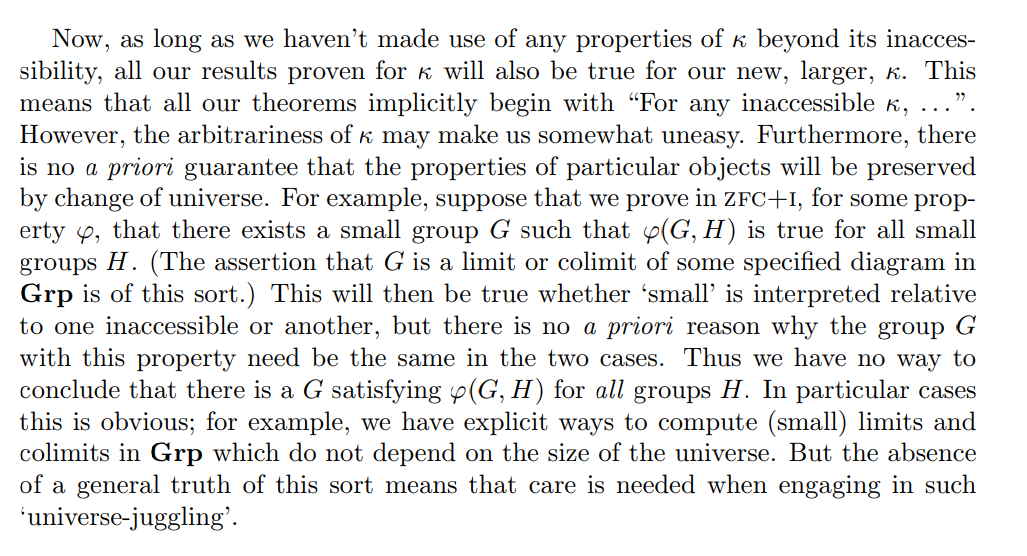I've asked a related question about nine months ago here, however, apparently, I lacked expertise to ask the precise question I want to ask here, as I wish to revisit the matter of universes. I hope it will not count as a duplicate.
One way to deal with set-theoretic difficulties when studying large categories are Grothendieck universes. In practice, it means that instead of studying, for example, the category of all abelian groups $\mathrm{Ab}$ we "fix" an arbitrary universe $\mathrm{U}$ and study the category $\mathrm{U\text{-}Ab}$ of all abelian groups which belong to $\mathrm{U}$. As $\mathrm{U}$ was arbitrary, everything we prove about $\mathrm{U\text{-}Ab}$ will be true for all categories $\mathrm{V\text{-}Ab}$ for any universe $\mathrm{V}$.
The thing that bothers me is: how can we circumvent the issue that we're not working with all abelian groups. Sure, adopting the axiom of universes ("every set is contained in some universe"), for every abelian group $G$ we have a an inverse $\mathrm{U}$ containing it, and that means that we have a category $\mathrm{U\text{-}Ab}$ which contains $G$ an object. But it doesn't solve all issues, at least not right away.
Mike Shulman in his notes says:
But then I don't understand why we can get away with this. Before reading this I though that any property of a $\mathrm{U}$-category can be directly translated to the "full" category, but it appears to be not the case. Why can we study, for examply, the category of $\mathrm{U}$-small algebraic varieties in algebraic geometry instead of the "full" category of all algebraic varieties? Or the category of compactly generated $\mathrm{U}$-small topological spaces in algebraic topology? Or the category of $\mathrm{U}$-small vector spaces over a field $F$?
Also, in this comment to his answer to my aforementioned question HeinrichD said that
"You won't be able to do many constructions with this "entire" category. And no, we don't really have to look at them. Also, it is common practice to just write "groups" when one uses U-groups if the context permits this."
My question here is why doesn't one need to study the "full" categories of schemes, topological spaces, vector spaces, symmetric spectra (and of any set satisfying a property $\phi(x)$, for that matter) together with a property for what it means to be a morphism between $x$ and $y$ such that $\phi(x)$ and $\phi(y)$, and can get away with studying they $\mathrm{U}$-versions (of $\mathrm{U}$-small sets $x$ satisfying $\phi(x)$ and so on...).
For any large category $\mathrm{C}$, does its version "restricted" to (an arbitrary) $\mathrm{U}$ suffice?
$\mathrm{P.S.}$ In the linked notes, apparently, Mike Shulman wrote a section concerning those limitations of universe, but his exposition is well over my head and seems to be aimed at logicians or at least logic students, besides, he seems to propose another foundation for large categories, from what I understand, an extension of $\mathrm{ZFC\text{+}U}$.

